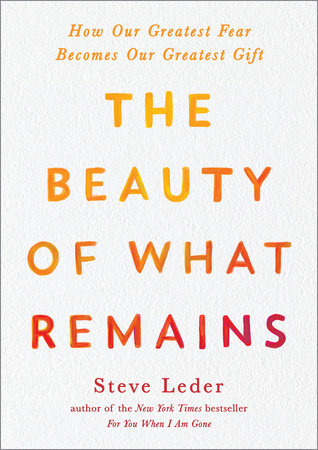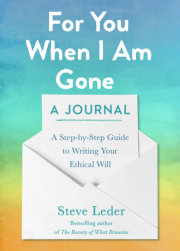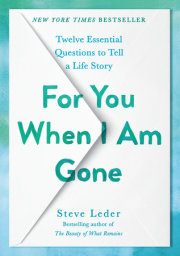We were a small group, most of us a year out of college and just back from Israel, where we had spent the first of our five-year curriculum learning Hebrew. Now that we were stateside, it was time to learn everything else required to serve our pulpits and keep our tradition alive. That included a field trip to death's storefront, the mortuary. Looking at the shallow, twin-bed-sized porcelain table on stainless-steel legs with a drain toward the bottom and a coiled hose above, I realized that I would have to face a lot of death in my career. You'd think I would have figured that out before I entered the seminary, but then again, how many people who decide what they want to be at fifteen really think things through? "This is where we wash and prepare the bodies," the mortician said matter-of-factly. He went on to describe what happened from the moment he arrived at a home or hospital to retrieve a body to the moment a family drove away from the gravesite, leaving their loved one buried beneath the earth.
That porcelain platform for washing and prepping, the casket showroom and the little signs with prices, the book of flower arrangements and the makeup room shocked me. I had been to only one funeral in my life: my grandmother's. I was seven years old. The only thing I remember was my auntie Geta crying in a way I had never heard anyone cry before. My classmates and I made a lot of sick jokes as we moved from room to room. But there was no denying death was going to be a regular part of my life, so I had a lot to learn.
I became a rabbi for a lot of both simple and complicated reasons. My father and uncle owned a junkyard, where I worked hard as a kid. Hard work was the only thing that seemed to get my father's attention; it was what he expected and what he valued. Any creative pursuit for which I showed potential-writing, music, acting-was summarily dismissed as frivolous. Sports were laughable. And my young mother, Barbara, overburdened as she was with five kids, made it clear when we were very young that she wasn't the carpooling, den mother, team mom sort of mother other kids on the block had. It was all she could do to feed us, keep the house clean, and manage the doctor and dentist appointments and parent-teacher conferences. If we wanted to do anything extra, we were on our own. With one exception-the synagogue.
Because Lenny Leder grew up in the Jewish ghetto of North Minneapolis, Jewish culture was all he knew, and as far as he was concerned, it was the only culture that mattered. My childhood was filled with Yiddish, sour pickles, bagels and smoked fish on Sunday mornings, and little care or contact with the larger world. If I wanted to play hockey or baseball, act in the school play, or write for the school paper, I had to figure out how to do that for myself, and there weren't going to be any pats on the back if I did. But if I wanted a ride to the synagogue to attend the youth group, Dad, and therefore Mom, were all in. It seemed as if anything I did at the synagogue made them proud and little if anything I did elsewhere other than sweating it out at the junkyard was even noticed. You don't have to be Sigmund Freud to understand why I became a rabbi.
When I was fourteen, I was smoking pot at school most days, failing algebra and Spanish, playing drums in a rock band, and heading for trouble. While my parents were away on vacation, my bandmates and I came up with the bright idea to steal some Bob Dylan albums from the local Target. We got caught by an undercover security guard and ended up at the police station, where my oldest sister had to pick me up and take me home until my parents returned from Florida for the meeting with the detective. I was the fourth of five children, and I think my parents were sort of over being parents by the time I and my little brother came around. The arrest was a warning to them that some oversight might be in order. Wary of psychologists, they went to our rabbi for counsel. He told them he thought what I needed was a change of peers and suggested they send me to a Jewish summer camp in Oconomowoc, Wisconsin. It was there I fell deeply in love. I loved the music, I loved the cool, guitar-playing hippie counselors. I loved the pretty girls from Chicago with flowers in their hair. It was the first time in my life I ever saw a rabbi in shorts and a T-shirt who could throw a baseball. It was a revelation to me that rabbis could be just like normal people yet also seem to possess a special, wise secret worthy of respect. That summer I knew that when I grew up, I wanted to be like them.
It was the beginning of a twelve-year journey toward ordination, at the end of which the fifteen-year-old in me was sure I would spend my time making camp as great for my future congregation's kids as it was for me. I would study and teach Talmud. I would write inspiring sermons, read and write wonderful books, and ponder the great mystery that is life itself. Standing in front of that autopsy and embalming table was my first indication that I was heading for something else too. It left me quietly, secretly, afraid.
Even after finishing my studies I remained afraid of dying and of death. One tour of a mortuary notwithstanding, rabbinical school had prepared me poorly for both. But I was fortunate enough to have a great mentor in the then-senior rabbi of my first congregation, where I have stayed my entire career and now serve as the senior rabbi myself. My first week on the job he took me with him to watch an unveiling ceremony. These ceremonies take place roughly a year after the burial and involve a few prayers followed by the unveiling of the headstone marking the grave. After leading the requisite prayers, the rabbi asked the widow to lift the cloth covering from the headstone. Instantly, she broke into sobs the likes of which I had not heard since my auntie Geta's at my grandmother's funeral-primal, uncontrollable, inconsolable, pent-up pain.
"I can't," she wailed.
I was paralyzed. My boss wasn't. He put his arm around her shoulder and said, "You can. Get control of yourself. Your children and grandchildren are here. That's it. Good . . ."
I watched in amazement as she stepped forward and lifted the cloth covering, revealing her husband's legacy carved into stone. I saw that people can and do face death and grief even when they think they can't. I never would have believed it at the time, but I have become much like my first boss and that funeral director whose tour shocked me with its matter-of-factness long ago. From years of experience, they understood that death really is a part of life-essential, universal, expected, mundane even. None of us are making history when we die, and in many ways, all our deaths are the same. I understand that now too.
Thirty-some years after that rabbinical school mortuary tour I am with my mother at the funeral home in Minneapolis. My father is deep into Alzheimer's, and ever the planner, my mother wants to make arrangements. The guy in charge knows his stuff, and after my mom introduces me as her son who's a rabbi in Los Angeles, he knows the same is true of me. We work our way through the checklist: type of casket; flowers for the casket spray; guestbook yes, video montage no; military honors no, Freemason honors yes; burial shroud no, prayer shawl yes. Music? "Mom, we gotta go with Hank Williams." Limo yes. I was glad that I could help my mom that day; that I had become a death professional who knew the behind-the-scenes machinations of it all. I was trying my best to be a rabbi and a son. And the truth is, if I had not had on the armor of my profession that day, if I had been only the son whose father was soon going to die, I am not sure what I would have done with so much sadness.
I had never spoken with my dad about what he wanted for his funeral, but I had asked him, a couple of years before this, if he was afraid of dying. I chose that particular visit with my dad to ask him if he was afraid, because I felt it was coming to the end of the time when he could still comprehend questions and respond with a nod, yes or no. The rabbi and the son in me wanted to ease whatever worry or fear he might have had at the time about what was happening to him. "Dad, you got a lot right," I told him. "I am a success because you taught me how to work harder than anyone else, and that has made all the difference." It was true. Other rabbis had higher SAT scores, know more Talmud, and speak better Hebrew than I do. But none I know of outwork me. Thank you, Dad.
Copyright © 2021 by Steve Leder. All rights reserved. No part of this excerpt may be reproduced or reprinted without permission in writing from the publisher.








